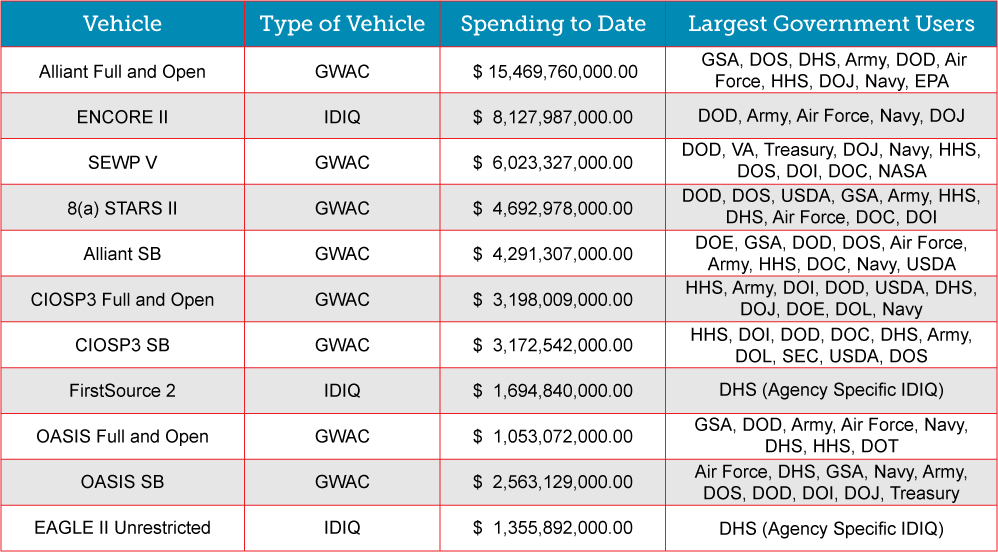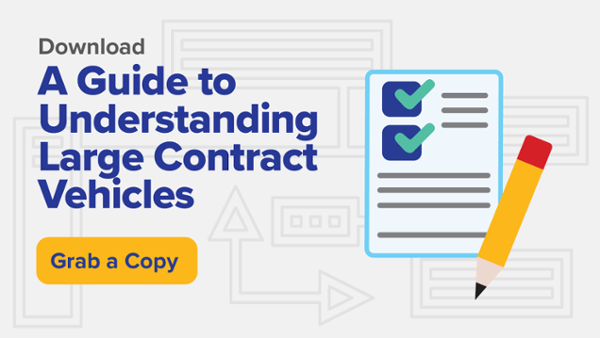So your company is hunting "big game" in the government contracting world? Well, you are not alone.
The Federal Government, both defense and civilian, operate their procurement and acquisition needs off of hundreds of contract vehicles a day. You may have heard of some of these vehicles: Alliant, OASIS, SEWP V, CIO-SP3.
But, how do you determine what type of large contract vehicle (GWAC, IDIQs, BPAs) is right for your company?
To demonstrate the massive spending on these vehicles, we took ten (10) well-known federal contract vehicles to explore their spending-to-date and who their largest government customers are.

To date, these ten (10) contract vehicles have spent over $51B on Government contracts. With all these opportunities and big dollars on the line, it’s surprising how few people take a step back and determine what type of large contract vehicle is right for you and your company.
Let’s take a look at the three most common types of large vehicles, what they are used for, who uses them, and why agencies prefer some over others.
IDIQ Contract (Indefinite Delivery, Indefinite Quantity): See FAR 16.504(a).
Type of contract that allows an agency to purchase an undefined quantity/delivery over a set period of time. IDIQs are restricted to use within the awarding agency or sister agencies – meaning they are not “government-wide” vehicles.
IDIQs are closed to new contractors until the contract expires, which ranges from 3-5 years. The Government uses IDIQs when it cannot predetermine, above a specified minimum, the precise quantitates of supplies or services that it will require during the PoP.
- Most used for: on-call service contracts, A-E services and job ordering contracting.
- Main users of IDIQs: DoD, DHS, HHS, and VA (DoD accounted for 68% of IDIQ obligations 2011 – 2015)
- Why do they like it: Contracting officials at DoD cited flexibility as the main advantage for using IDIQ contracts, noting it was easier and faster to place an order under an existing IDIQ contract than to award a separate one when a separate need arose. *
GWAC Contract (Government-wide Acquisition Contract) and/or IDV (Indefinite Delivery Vehicle): See FAR 17.502-2.
Type of contract in which multiple Government agencies align their needs and purchase a contract for goods and services. This type of contract allows for economies of scale to reduce per-unit costs. GWACs consolidate purchases instead of having each agency enter into an individual contract.
- Most used for: They say IT services but they use it for almost everything now
- Main users of IDIQs: Each GWAC is operated by an Executive Agent designated by OMB
- Why do they like it: A lot of agencies like GWACs but it can be cumbersome of them to use it. If an agency is contemplating use of a GWAC contract order, then a written determination of “best procurement approach” is required (See FAR 17.501(a)). If the requiring agency will place the order a delegation of authority from the GWAC Program Office, this determination should be made as a part of the procurement planning process, prior to obtaining the delegation. If using the services of a procurement support operation, the determination is made prior to requesting the assistance of the procurement support operation and both the requiring agency and ordering agency must retain file copies of the requiring agency’s determination.
BPA Contract (Government-wide Acquisition Contract) (Blanket Purchase Agreement): See FAR 13.303.
A simplified acquisition method that Government agencies use to fill anticipated repetitive needs for supplies and services. Essentially, BPAs are like “charge accounts” set up with trusted supplies. BPAs are negotiated on an individual agency level, and generally, only a small number of agency offices can place orders on them. BPA orders cannot exceed the simplified acquisition threshold of $150,000.
- Most used for: When there is a wide variety of items in a broad class of supplies or services that are generally purchased; when there is a need to provide commercial sources of supply for one or two more offices or projects that do not have or need authority to purchase otherwise; use would avoid writing multiple purchase orders.
- Why do they like it: Both agencies and vendors like BPAs because they help cut the red tape associated with repetitive purchasing. Once set up, repeat purchases are easy for both sides.
*BPAs sometimes are not considered as contracts, according to GAO.
CONCLUSION
It is important to remember your large vehicle contract lingo when selling to any Government customer or end-user, as well as identifying the various dialects that every federal agency, defense or civil, speaks. It is hard enough to get your foot in the door and get 5 minutes in front of your prospect - so when you get your shot, make sure you are speaking the same language.
Happy Hunting!









